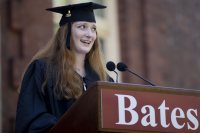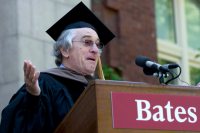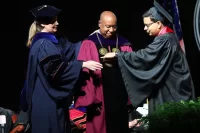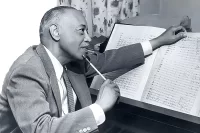
Bates Commencement Slated for May 27; Achebe to Speak
Celebrated Nigerian novelist Chinua Achebe, an articulate champion for Africans in the postcolonial era, will deliver the commencement address at Bates College on May 27, announced Bates President Donald W. Harward.
Joining Achebe as honorary-degree recipients will be one of America’s most eloquent ministers, Peter J. Gomes, a Bates alumnus; human-rights activist Natalie Webber Gulbrandsen, a Bates alumna; and entomologist Edward O. Wilson. Harward will confer bachelor’s degrees on approximately 390 seniors in an outdoor ceremony at 10 a.m. in front of Coram Library, following the traditional procession of seniors and faculty, which will be led by bagpipers. In case of rain, the graduation exercise will be held in the Margaret Hopkins Merrill Gymnasium.
A novelist, short-story writer, poet and essayist, Achebe is one of the most important figures in contemporary African literature. His novels, chronicles of the colonization and independence of Nigeria, are among the first works in English to present an authentic rendering of African culture. Achebe’s works are a successful fusion of Ibo folklore, proverbs and idioms with Western ideologies and Christian doctrine.
“Things Fall Apart” (1958), Achebe’s first novel, is considered a classic of contemporary African fiction for its realistic portrait of Ibo society at the turn of the century when Europeans first came upon the Niger.
His subsequent novels “No Longer At Ease” (1960), “Arrow of God” (1964), “A Man of the People” (1966) and “Anthills of the Savannah” (1987) bore out the early promise of his first award-winning book. Critic G.S. Killam calls Achebe “arguably the most widely read and discussed African writer of his generation.”
The author of two-short story collections, “The Sacrificial Egg, and Other Stories” (1962) and “Girls at War, and Other Stories” (1973), he also has published several essay collections as well as two volumes of poetry, including “Beware Soul Brother, and Other Poems” (1971), the winner of the first (British) Commonwealth Poetry Prize in 1972.
The fifth of his parent’s six children, Achebe was raised in an evangelical Christian family in the village of Ogidi. He attended Government College in Umuahia and University College in Ibadan, and received his B.A. from London University in 1953.
His first career, in radio, ended abruptly in 1966 when Achebe left his position as director of external broadcasting in Lagos during the national upheaval and massacres that led to the Biafran War (1967-70). The Charles P. Stevenson Jr. Professor of Languages and Literature at Bard College since 1990, Achebe retired in 1981 from the University of Nigeria, Nsukka, where he was named professor emeritus four years later. He taught in the English departments at the University of Massachusetts, Amherst, from 1972-75, and at the University of Connecticut, Storrs, from 1975-76.
Achebe has received numerous honors from different parts of the world, including more than 20 honorary doctorates from universities in Britain, the United States, Canada and Nigeria, as well as Nigeria’s highest award for intellectual achievement, the Nigerian Order of National Merit.
Peter J. Gomes ’65 is the Plummer Professor of Christian Morals and minister of the Memorial Church at Harvard University. Since being named by Time Magazine in 1979 as one of America’s seven most influential preachers, he has remained an insistent voice of conscience, blending a conservative view of religion and morality — he is a leading authority on the Pilgrims of Plymouth–with contemporary concern for the physical and spiritual welfare of all Americans. His closely reasoned sermons are among the quintessential Harvard experiences.
Natalie Webber Gulbrandsen ’42 is president of the International Association for Religious Freedom, a worldwide organization based in London which promotes human rights, interreligious cooperation, peace and justice. She previously was moderator of the Unitarian Universalist Association, an officer in the Girl Scouts organization and a member of numerous Wellesley (Mass.) civic groups.
Edward O. Wilson is an entomologist, evolutionary biologist, naturalist and author. His development of sociobiology in the 1970s made him a convenient target for those who say nurture is all, nature nothing, in animal and human development. But sociobiology has prevailed as among the most important work ever done on animal behavior, and Wilson has emerged as a leading theorist in support of conservation, particularly biodiversity. His book “The Insect Societies” (1971) remains a classic.




